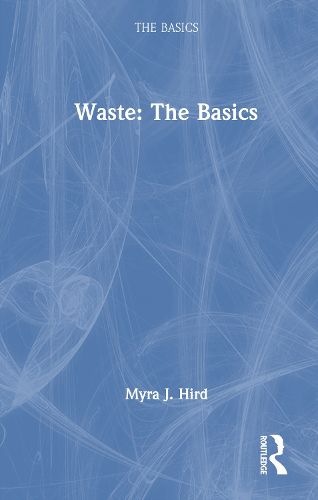Readings Newsletter
Become a Readings Member to make your shopping experience even easier.
Sign in or sign up for free!
You’re not far away from qualifying for FREE standard shipping within Australia
You’ve qualified for FREE standard shipping within Australia
The cart is loading…






Waste: The Basics answers the questions: why are we facing a global waste crisis, and how can we effectively solve it? The book identifies the most common types of waste, its major producers, how we manage waste locally, regionally and globally, and why this management is leading to more waste.
Written in a highly accessible style, the book begins with our own everyday mundane experiences of creating waste (those objects or materials we toss in the garbage or recycling bin) and shows how these practices are connected to a global system that manages waste ineffectively. Drawing on a wealth of historical documents and empirical research, Hird unpacks the complex relationship that waste has with global structures of capitalism, neoliberalism, international trade, poverty, racialized and gendered relations, and social injustice. Armed with the basic facts about our 'waste-maker' global society, the author concludes that only by understanding waste as a byproduct of how society is organized around extraction, production, and consumption may we solve our increasing waste crisis through refusal, reduction, reuse, and re-orienting our lives to fit planetary sustainability boundaries.
Waste is written for students and general readers interested in waste as a human health and environmental issue. It is for anyone curious about where objects really go once we put it in the trash or recycling bin.
$9.00 standard shipping within Australia
FREE standard shipping within Australia for orders over $100.00
Express & International shipping calculated at checkout
Waste: The Basics answers the questions: why are we facing a global waste crisis, and how can we effectively solve it? The book identifies the most common types of waste, its major producers, how we manage waste locally, regionally and globally, and why this management is leading to more waste.
Written in a highly accessible style, the book begins with our own everyday mundane experiences of creating waste (those objects or materials we toss in the garbage or recycling bin) and shows how these practices are connected to a global system that manages waste ineffectively. Drawing on a wealth of historical documents and empirical research, Hird unpacks the complex relationship that waste has with global structures of capitalism, neoliberalism, international trade, poverty, racialized and gendered relations, and social injustice. Armed with the basic facts about our 'waste-maker' global society, the author concludes that only by understanding waste as a byproduct of how society is organized around extraction, production, and consumption may we solve our increasing waste crisis through refusal, reduction, reuse, and re-orienting our lives to fit planetary sustainability boundaries.
Waste is written for students and general readers interested in waste as a human health and environmental issue. It is for anyone curious about where objects really go once we put it in the trash or recycling bin.